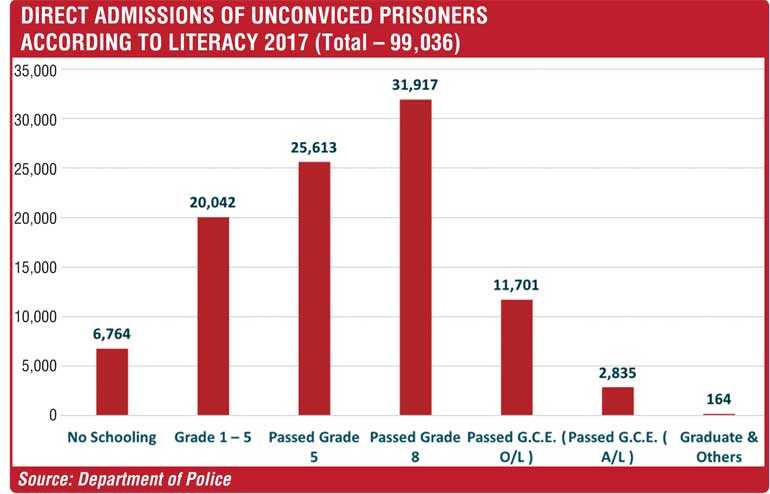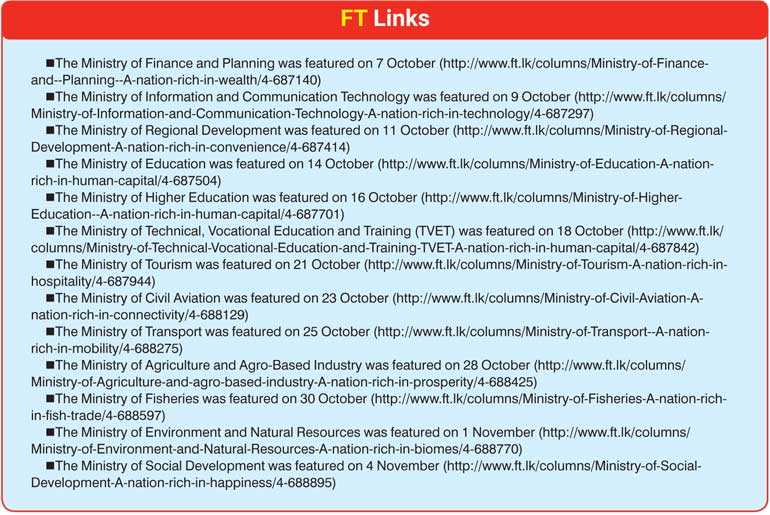Tuesday Feb 24, 2026
Tuesday Feb 24, 2026
Wednesday, 6 November 2019 00:50 - - {{hitsCtrl.values.hits}}
This series is based on business leader Dhammika Perera’s recently revealed ‘Economic Growth Strategy and Action Plan to increase GDP Per Capita from $ 4,000 to $ 12,000’. The document outlines goals and action plans for 23 ministries and today’s column focuses on the Ministry of Justice and Prison Reforms
Goals
 Action planPolice Department Smart Security
Action planPolice Department Smart Security
a. Implement unique digital biometric identification for people under investigation by the Police.
b. Set up CCTV cameras in all major public and private establishments with facial recognition technology.
c. Share criminal databases with world security agencies. Further, utilise facial recognition at airports to be alerted regarding any potential terrorists trying to enter the country.
d. Explore real-time facial recognition through smart glasses for the Police.
e. Predict potential criminal acts through the analysis of data science to monitor social media activities and predict potential criminal acts.
1. Provide all Police services in each district, e.g. at present, Police clearance certificate to seek employment abroad is issued only in Colombo.
2. Introduce a “Home Police” program.
The proposed “Home Police Program” provides door-to-door services to resolve any minor disputes within the community. Recruit 4,960 female Police officers, (10 officers per station, totalling to 496 Police stations across the island) and provide 5 motorbikes per station.
1,700 Police officers retire every year, and these officers could be recruited and trained online and onsite for their tasks, including policing domestic issues such as child abuse, domestic violence, and school safety, to reduce the current daily complaints from 3,000 to 2,000.
“Home Police Program” to be monitored centrally and completed within a period of 3 years.
3. Accelerate investigations through real-time information exchange. This will happen through an electronic witness statement that consists of electronic suspect image, mobile digital case file with real-time sharing, digital evidence capture, mobile ID verification, multisystem search in custody and crowdsourced investigation through social media.
4. Streamline and digitalise processes such as speeding tickets to increase efficiency.
5. Explore proactive policing: utilise demand forecasting technology to reach potential crime scenes pre-emptively. Use predictive policing analytics to model future risks and evidence-based intelligence analytics to drive deployment decisions.
6. Introduce spot fines through handheld electronic or mobile payment systems to introduce spot fines.
7. Build dedicated drug-testing labs and DNA testing labs in each district to assist finding evidence for Police investigations.
8. Introduce the e-Police application, which is an integrated platform to address the needs of all law enforcement units such as automated biometric identification systems, forensic analysis and case-management systems.
9. Introduce online training videos for Police officers.
10. Launch an official YouTube channel to spread awareness on substance abuse and mental health services.
11. Launch a free app that empowers healthcare practitioners to provide effective, evidence-based care for opioid use disorders when providing Medication-Assisted Treatment (MAT).
12. Publish an online magazine for parents addressing teenage drug abuse and effects of alcohol and rehabilitation. Articles could cover the following areas:
a. Addiction and how to overcome it
b. Hidden signs of drug addiction
c. How each day in rehabilitation leads to personal improvement
d. Why Fentanyl is threatening Sri Lanka
e. Why ignoring mental health and addiction can be a very costly mistake
f. Teens and cannabis
Prison rehabilitation Disciplined citizens
Sri Lanka had 99,036 unconvicted prisoners in 2017, of whom 6.8% had no schooling, 52.9% had studied only up to grade 5, and 85.1% had studied only up to grade 8. However, the total percentage of unconvicted prisoners who passed A/Ls and progressed in education beyond A/Ls was only 3.1%.
Therefore, if every child is educated at least up to A/Ls, 50% of prisons can be shut down.
1. Use biometric technology such as Pronto to record offenders’ details at the point of arrest. This information is then stored in an online database that all Police personnel can access. Uses and benefits include Police being able to identify offenders in real-time using their thumbprint, the ability to instantly access the national Police database while in the field, and streamlining and digitalising processes such as speeding tickets to increase efficiency.
2. Introduce a debt relief program to prisons, where prisoners can engage in community service to obtain relief from fines and court fees.
3. Reduce the prison sentence by four days for every pre-approved book on science, literature, religion and history, that is read and reviewed.
A judicial and legal system that protects individual rights and freedom and enforces good governance.

Ministry of Justice
1. Reduce corruption by carrying out the following;
a. Each Ministry should have a member from the Commission to Investigate Allegations of Bribery and Corruption.
b. Each Ministry should have a member from the Auditor General’s Department.
c. Introduce an e-procurement system for all procurement processes.
d. Introduce new legislation on governing political funding and discourage lobbying.
e. Introduce a proper asset declaration system for Members of Parliament.
f. Introduce standard clauses in project procurements, undertakings in order to protect Government interests in all projects/contracts involving Government, statutory bodies and State-Owned Enterprises (SOEs).
g. In the case of any breach of contract(s), the Government can at any given time, terminate or/and file a civil suit against the party who breaches the contract.
2.Improve infrastructure of courthouses, ensure they have basic amenities, seating and lighting.
3.Provide or replace computers in courtrooms, sound equipment, multimedia equipment, essential software and a fast internet connection.
4.Employ an adequate number of trained non-judicial staff to ensure efficient running of the courthouse.
5.Establish an institute to train personnel to provide court services such as translation, transcription, stenography, and computer systems management.
6.Introduce a digital court information system.
7.Introduce fast-track courts that specialise in rape cases.
Courts will hear rape trials daily and investigations of rape cases must be completed within 4 months, and the trial must be completed within a year.
This will be accomplished by;
a.Having manpower dedicated to investigating cases of rape.
b.Each district will have a dedicated forensic lab to process evidence.
c.Special forensic kits for cases of ape will be provided to all hospitals and Police stations.
c.Create an online database that allows;
a. The public to read every draft law submitted. It should be possible to see who submitted the legislation, its current status, and changes made to it during the Parliament process.
b.Citizens to follow council sessions live.
c.Provide city legislation and other documents online.
This would reduce corruption and encourage citizens to take an interest in legislative affairs.
9. Introduce drug courts with online video conferencing facilities connected to Police stations, where people who have been arrested while using drugs are sent to rehabilitation directly instead of being sent to prison.
Current laws to be maintained for those arrested for the possession or sale of drugs.
After serving the rest of their detention in the community, convicts stay at home with curfew and electronic monitoring, working/studying during the day and staying at supervision centres at night, or at a halfway house with a structured program.
